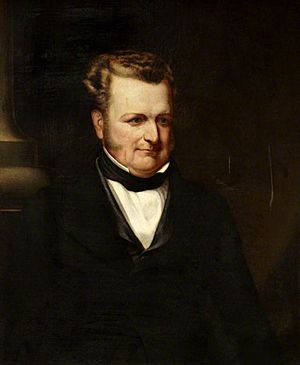John Frederic Daniell facts for kids
Quick facts for kids
John Frederic Daniell
|
|
|---|---|
 |
|
| Born | 12 March 1790 |
| Died | March 13, 1845 (aged 55) |
| Nationality | English |
| Alma mater | University of Oxford (Doctor of Civil Law, 1842) |
| Awards | Rumford Medal (1832) Copley Medal (1837) Royal Medal (1842) |
| Scientific career | |
| Fields | Chemistry Physics |
| Institutions | King's College London |
John Frederic Daniell (born March 12, 1790 – died March 13, 1845) was an English chemist and physicist. He is famous for inventing the Daniell cell, which was a much-improved electric battery. He also created other important scientific tools.
Contents
About John Frederic Daniell
John Daniell was born in London, England. He became a very important scientist.
His Work as a Professor
In 1831, Daniell became the first professor of chemistry at the new King's College London. Later, in 1835, he took a similar job at the East India Company's Military Seminary in Addiscombe, Surrey. He taught many students about chemistry and physics.
His Amazing Inventions
Daniell is best known for inventing the Daniell cell. This was a type of electric battery that worked much better than older ones. It helped scientists learn more about electricity.
He also invented a special tool called a hygrometer. This hygrometer could measure how much moisture was in the air. It was known as the "dew-point hygrometer." He also created a pyrometer, which is a tool used to measure very high temperatures.
In 1830, Daniell built a large water-barometer at the Royal Society. He used it to study air pressure and how it changes. He even found a way to make gas for lighting from turpentine and resin. This gas was used in New York City for a while!
Special Recognition
In 1842, the University of Oxford gave him an honorary degree. This was a special award to recognize his important scientific work.
Public Lectures
In 1840, John Daniell was asked to give a special talk. He delivered the Royal Institution Christmas Lecture on "The First Principles of Franklinic Electricity." These lectures are very famous and are given to help people understand science.
His Legacy
John Daniell passed away suddenly in London in March 1845. He was attending a meeting of the Royal Society, where he had been a member since 1813.
To honor his contributions to science, a lunar crater on the Moon was named after him. It is called Daniell.
See also
 In Spanish: John Frederic Daniell para niños
In Spanish: John Frederic Daniell para niños
- Timeline of hydrogen technologies
 | John T. Biggers |
 | Thomas Blackshear |
 | Mark Bradford |
 | Beverly Buchanan |

